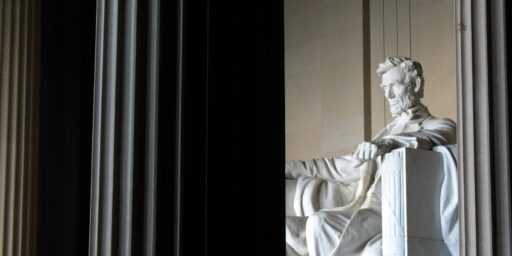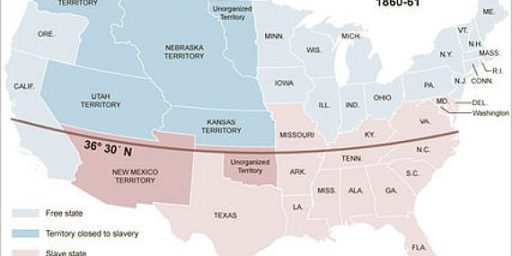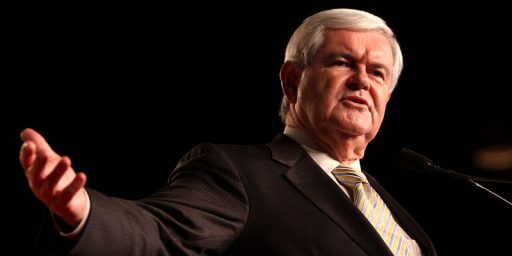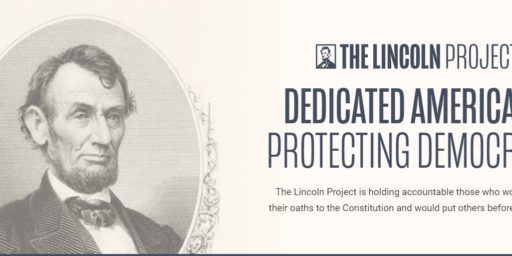Paragraph of the Day (Labor and Capital Edition)
“Labor is prior to, and independent of, capital. Capital is only the fruit of labor, and could never have existed if labor had not first existed. Labor is the superior of capital, and deserves much the higher consideration. Capital has its rights, which are as worthy of protection as any other rights. Nor is it denied that there is, and probably always will be, a relation between labor and capital, producing mutual benefits. The error is in assuming that the whole labor of community exists within that relation”—noted Marxist, Abraham Lincoln (in his first State of the Union address).
I find this amusing given the likely uproar in certain quarters of our politics that would result if a president said such things in the current era.






That’s it! I’m heading for Mt Rushmore right now with a case of dynamite and a fifth of Glenmorangie.
That’s okay… a Republican said it. We all know — and are constantly reminded — that Republicans don’t know anything and they’re wrong about what they think they know.
Now, if that had come from Stephen Douglas, it would have carried weight!
@John Burgess:
Nietzsche said the last Christian died on Calvary. I’d say the last Republican gave that State of the Union speech.
Nice try, but the Republican Party of today is very different from the Republican Party of the 1860s, just as the Democratic Party of the 1860s (including Stephen Douglas) is very different from the Democratic Party of today…next time, why don’t you compare apples and oranges…
I see that essentially as a digest or inference from Locke’s Second Treatise. The development of property goes from one’s ownership of one’s self, to one’s personal property, to real property, to capital via the agency of work.
@An Interested Party: “…the Republican Party of today is very different from the Republican Party of the 1860s, just as the Democratic Party of the 1860s…”
No Shit Sherlock!!!
Perhaps it needs context but the quote offers little to be concerned about. No doubt there is a sentence the “labor deserves most of the profits” crowd will latch onto but that isn’t what it seems he means.
Let’s break it down. In a beginning state, without family or friends to stake one with capital, one only had their labor. They develop capital from the profits of their labor, i.e., that part of the pay generated in excess of sustenance. With saving and delay of gratification, capital accumulates, which can then be used to build profitable activity perhaps requiring less strenuous labor and perhaps creating opportunities for others to exchange their labor for consideration thus beginning their journey toward capital accumulation. There is also a relation whereby particularly unique labor may attract capital due to the expected returns from that labor, e.g., investment in inventors or authors.
Thus labor came first, labor generates capital (if you add the labor of thriftiness). Labor can exist without capital thus it is superior and deserves a higher consideration. The tragedy is that labor, especially the creation of useful things by manual labor, is and has been denigrated in human society. The most useful labor but also the most strenuous left to slaves.
Now capital has rights otherwise it wouldn’t exist. Failure to protect those rights, results in capital evaporating since if it can’t be assured protections the owner is better to fritter it away on personal pleasures. There is a relation between labor and capital, in its accumulation and in the creation of enterprises that provide labor opportunities to others to transform labor to capital for their own use.
However, Lincoln’s first inaugural occurred under the cloud of civil war. No doubt, arguments were being made to let the South go rather then waste labor waging war. So he had to make the argument that there were some labors of a community that were not for gain to the capital investor or the capital accumulator. (of course, as per norm, he neglects those who stood to profit from the war due to contracts with his administration)
So where is it that Lincoln is following the marxist doctrine that labor should achieve most of the profits irregardless that those profits were not possible without the investment of capital in risky speculations? In fact, Lincoln could be saying that while labor is superior to capital, sometimes labor has to give back the community in manners that will not lead to capital formation. Or in layman’s terms, grab a gun son, you’ve been drafted.